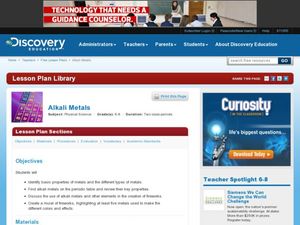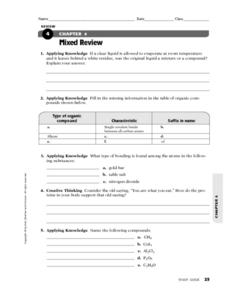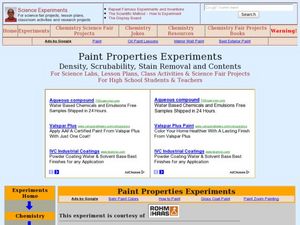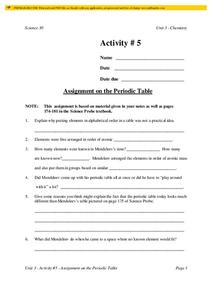NOAA
Ocean Zones
How can organisms light up in water? Bioluminescence is light produced in a chemical reaction that can occur in an organism's body. First, learners determine what happens to light/color as you move into the deep ocean. In groups, they...
Maryland Department of Natural Resources
Eyes on Dissolved Oxygen
Learn about the factors that affect the way oxygen dissolves in salt water with a chemistry lab. After studying the molecular structure of water, young scientists figure out how aeration, temperature, and organic waste affect dissolved...
Howard Hughes Medical Institute
Winogradsky Columns: Microbial Ecology in the Classroom
Winogradsky columns are ideal for observing the role of bacteria and other microorganisms in an ecosystem. This student activity guide is complete with data tables for observations and analysis questions for processing what was observed....
Mr. Jones's Science Class
Periodic Table Project
Don't be fooled by the title; this is not really a lesson on elements. It is a project on classification, using the periodic table as an example. For that reason, it could be used in any branch of science. As an example, a group may...
Curated OER
Chemistry First Marking Period Review
In this chemistry review worksheet, students review terms and concepts covered. Students practice metric conversions, factor labeling, temperature conversions, heat calculations, atomic structure, and gas laws. This worksheet has 3...
Curated OER
Review of Ionic and Covalent Compounds and Transitioning from Ionic to Covalent Compounds
Here is a unique assigment: compare and contrast ionic and covalent compounds in an extensive data table and then analyze Lewis dot structures in antoher. Three columns are to befilled in: "characteristic or feature," "applies to ionic...
Curated OER
Activity #15 What Happens To A Liquid As Energy Is Added?
Pupils model the arrangement of particles in a liquid. They use the model, to demonstrate how a gas is formed from a liquid with no increase in temperature as energy is added. Pupils model the arrangement and movement of gas particles.
What affects Frog metamorphosis?
In this lab, students explore pollutants which affect frog metamorphosis using household pollutants (vinegar, oil, and bleach) and sponge capsules.
Curated OER
Chemistry
In this chemistry worksheet, students describe an atom, its parts, the charges of these parts, and atoms life functions. Then they explain what the octet rule states for the placements of electrons around the nucleus of an atom. Students...
Curated OER
Chemosynthesis in the Classroom
Students observe the development of chemosynthesis in bacterial communities. In this bacteria lesson students explore that chemosynthesis is and how it is relevant to biological communities.
Curated OER
Introduction to the Periodic Table of Elements
Learners explain how the elements are arranged in the periodic table. In this chemistry instructional activity, students determine the subatomic particles for certain elements. They research the physical and chemical properties of an...
Curated OER
Alkali Metals
Middle schoolers explore the unique properties of alkali metals. For this chemistry lesson, students create a mural of fireworks display after researching its different element components. They write a brief description about an alkali...
Curated OER
The Chemistry of Life
In this chemistry of life activity, students will review key terms of plant cell structure and chemistry by reading 13 clues to complete the puzzle. Word bank is included.
Chicago Botanic Garden
Climate and Forest Ecosystem Services
Forests, through sequestration, capture excess carbon dioxide in our atmosphere and store it, aiding in climate change. The third installment in a four-part series on how climate impacts forests explores carbon sequestration. Classes...
Curated OER
Geometric Isomerism (Different Geometries)
Here is an interactive presentation on molecular geometry if you have materials for building molecule models along the way. Isomerism is introduced by means of a graphic organizer. Viewers then imitate two molecule models and learn that...
Curated OER
Mixed Review
In this chemistry worksheet, students solve chemical equations and define terminology using previous knowledge. There are 8 review questions.
Curated OER
IUPAC Rules for Naming Compounds with Functional Groups
In this naming compounds with functional groups worksheet, students read about using the IUPAC rules for naming these compounds and they draw structures for 3 -carbon, 2-carbon and 4-carbon molecules and give the names for each.
Curated OER
Is it Alive?
Students watch a demonstration using Duco glue and water and try to determine if the "monster" shown is alive. After the demonstration, they discuss what characteristics make an organism "alive". They participate in a card sorting...
Curated OER
Quantitative Determination of the Composition of Water-based Paints and the Correlation of Paint Properties to Pain Composition
Students perform a series of tests on water-based paints. In this chemistry lesson plan, students identify their different functions. They calculate paint density and fractional concentrations.
Curated OER
What can I do?
Pupils identify feelings and explore positive ways to handle conflict. In this mental health lesson students discuss feelings and how to constructively handle them.
Curated OER
Aluminum Adventure
Chemistry aces use an electrochemical cell to anodize a strip of aluminum. They apply an organic dye to it. In a practical application, they design a piece of jewelry out of the anodized metal and describe the process. Thorough notes...
Kenan Fellows
Effects of a Golf Course on Stream Health
Is the golf course causing issues in the stream? Find out with a resource that has groups perform chemical water tests to analyze the effects of a golf course on a stream. Pupils collect water above and below the course and analyze the...
Curated OER
Periodic Table
In this periodic table worksheet, students determine why the periodic table is organized the way it is and compare and contrast the characteristics of the different grouping of elements. This worksheet has 22 short answer and 36 fill in...
Aquarium of the Pacific
Lego Molecules
Young scientists construct an understanding of molecular compounds in this hands-on science lesson plan. Using LEGO® to model the atoms of different elements, students build molecules based on the chemical formulas of common compounds.

























